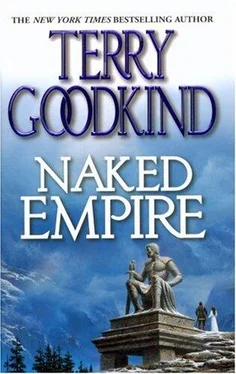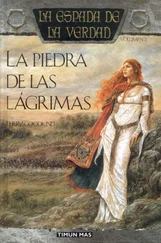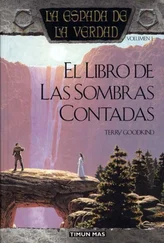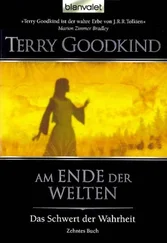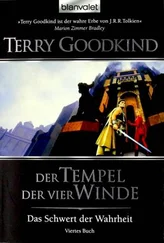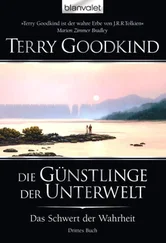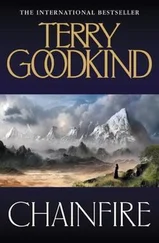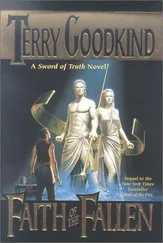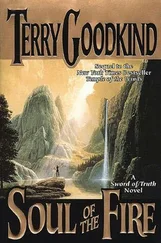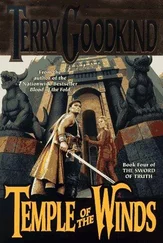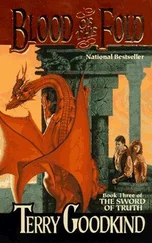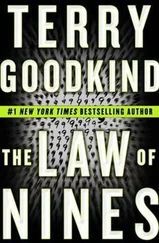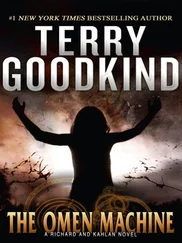He let out a breath and lowered his voice. “There were too many to execute, so they did the next best thing—they banished them.”
Kahlan’s eyebrows went up. “Banished them? To where?”
Richard leaned toward her with fire in his eyes. “The Old World.”
“What!”
Richard shrugged, as if speaking on behalf of the wizards back then, mocking their reasoning. “What else could they do? They could hardly execute them; they were friends and family. Many of those normal people with the spark of the gift—but who were not gifted as wizards or sorceresses and so didn’t think of themselves as gifted—had sons, daughters, brothers, sisters, uncles, aunts, cousins, neighbors who had married these pristinely ungifted, these pillars of Creation. They were part of society—a society which was less and less populated by the truly gifted.
“In a society where they were increasingly outnumbered and mistrusted, the ruling gifted couldn’t bring themselves to put all these tainted people to death.”
“You mean they even considered it?”
Richard’s eyes told her that they had and what he thought of the notion. “But in the end, they couldn’t. At the same time, after trying everything, they now realized that they couldn’t ever restore the link to magic once it was broken by these people, and such people were marrying and having children, and the children were marrying and having children—who in every case passed along this taint. And, those so tainted were increasing in numbers faster than anyone had imagined.
“As far as the gifted were concerned, their very world was threatened, in much the same way it had been threatened by the war. That was, after all, what those in the Old World had been trying to do—destroy magic—and here it was, the very thing they feared, happening.
“They couldn’t repair the damage, they couldn’t stop it from spreading, and they couldn’t put to death all those among them. At the same time, with the taint multiplying, they knew that they were running out of time. So, they settled on what to them was the only way out—banishment.”
“And they could cross the barrier?” she asked.
“Those with the gift, for all practical purposes, were prevented from crossing the barrier, but for those who were pillars of Creation, magic did not exist; they were unaffected by it, so, to them, the barrier was not an obstacle.”
“How could those in charge be sure they had all the pillars of Creation? If any escaped, the banishment would fail to solve their problem.”
“Those with the gift—wizards and sorceresses—can somehow recognize those pristinely ungifted for what they are: holes in the world, as Jennsen said those like her were called. The gifted can see them, but not sense them with their gift. Apparently, it wasn’t a problem to know who the pillars of Creation were.”
“Can you tell any difference?” Kahlan asked. “Can you sense Jennsen as being different? Being a hole in the world?”
“No. But I’ve not been taught to use my ability. How about you?”
Kahlan shook her head. “I’m not a sorceress, so I guess that I don’t have the ability to detect those like her.” She shifted her weight in her saddle. “So, what happened with those people back then?”
“The people of the New World collected all those ungifted offspring of the House of Rahl and their every single last descendant, and sent the whole lot of them across the great barrier, to the Old World, where the people had professed that they wanted mankind to be free of magic.”
Richard smiled with the irony, even of such a grim event as this. “The wizards of the New World, in essence, gave their enemy in the Old World exactly what they professed to want, what they had been fighting for: mankind without magic.”
His smile withered. “Can you imagine deciding that we had to banish Jennsen and send her into some fearful unknown, simply because of the fact that she can’t see magic?”
Kahlan shook her head as she tried to envision such a time. “What a horror, to be uprooted and sent away, especially to the enemy of your own people.”
Richard rode in silence for a time. Finally, he went on with the story.
“It was a terrifying event for those banished, but it was also traumatic almost beyond endurance to those who were left. Can you even imagine what it must have been like. All those friends and relatives suddenly ripped out of your life, your family? The disruption to trade and livelihood?” Richard’s words came with bitter finality. “All because they decided some attribute was more important than human life.”
Just listening to the story, Kahlan felt as if she had been through an ordeal. She watched Richard riding beside her, staring off, lost in his own thoughts.
“Then what?” she finally asked. “Did they ever hear from those who were banished?”
He shook his head. “No, nothing. They were now beyond the great barrier. They were gone.”
Kahlan stroked her horse’s neck, just to feel the comfort of something alive. “What did they do about those who were born after that?”
Still he stared off. “Killed them.”
Kahlan swallowed in revulsion. “I can’t imagine how they could do that.”
“They could tell, once the child was born, if it was ungifted. It was said to be easier then, before it was named.”
Kahlan couldn’t find her voice for a moment. “Still,” she said in a weak voice, “I can’t imagine it.”
“It’s no different from what Confessors did about the birth of male Confessors.”
His words cut through her. She hated the memory of those times. Hated the memory of a male child being born to a Confessor. Hated the memory of them being put to death by command of the mother.
There was said to be no choice. Male Confessors in the past had had no self-control over their power. They became monsters, started wars, caused unimaginable suffering.
It was argued that there was no choice but to put a male child of a Confessor to death, before they were named.
Kahlan couldn’t force herself to look up into Richard’s eyes. The witch woman, Shota, had foretold that she and Richard would conceive a male child.
Neither Kahlan nor Richard would ever for an instant consider harming any child of theirs, a child resulting from their love for one another, from their love of life. She couldn’t imagine putting a child of theirs to death for being born a male child of her as a Confessor, or an ungifted male or female child of Richard for being a Rahl. How could anyone say that such a life had no right to exist because of who they were, what they were like, or what they might possibly become.
“Somewhere along the line after this book was written,” Richard said in a quiet voice, “things changed. When this book was written, the Lord Rahl of D’Hara always married, and they knew when he produced an offspring. When the child was pristinely ungifted, they ended its life as mercifully as they could.
“At some point, ruling wizards of the House of Rahl became like Darken Rahl. They took any woman they wanted, whenever they wanted. The details, such as if an ungifted child born of those couplings was actually a pillar of Creation, became unimportant to them. They simply killed any offspring, except the gifted heir.”
“But they were wizards—they could have told which ones were like that and at least not killed the rest.”
“If they wanted, I suppose they could have, but, like Darken Rahl, their only interest was in the single gifted heir. They simply killed the rest.”
“So, such offspring hid for fear of their life and one managed to escape the grasp of Darken Rahl until you killed him first. And so you have a sister, Jennsen.”
Richard’s smile returned. “And so I do.”
Читать дальше
